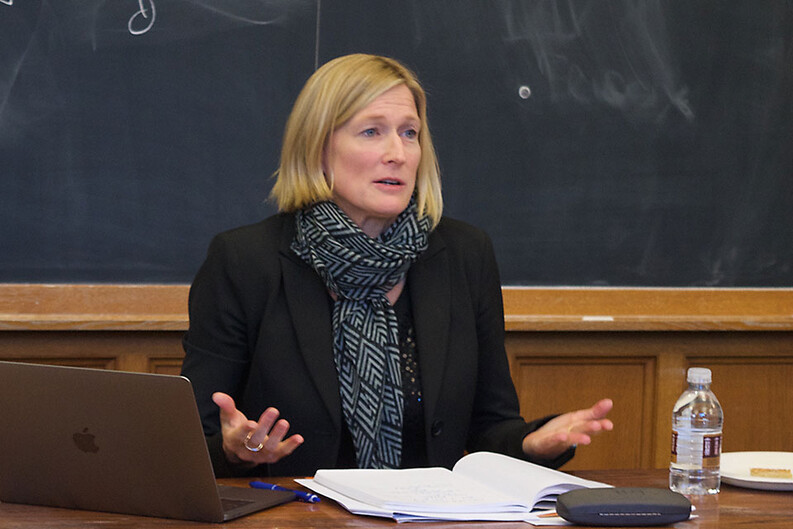Human Rights First’s Melissa Hooper on Illiberalism in Poland

Melissa Hooper, director of Human Rights & Civil Society at Human Rights First, spoke at the Schell Center’s Human Rights Workshop on November 9, 2017. Her talk covered recent developments in Poland that threaten democracy and human rights within the country.
The growth of illiberalism in Poland, Hooper explained, is due to the rise of the far-right, nationalist party PiS. Hooper explained that PiS, the Law and Justice Party, came to power in 2015 and has since been “pushing through legislation on a very fast schedule,” “passing legislation without consultation with the public,” and even “acting under cover of night” to minimize potential opposition. Hooper was particularly concerned about three bills passed by PiS earlier this year, which aimed to place the judiciary under the party’s control. One bill, which was signed into law, fired all local and regional judges and gave the Minister of Justice the power to replace them. The other bills, which the president vetoed, would have done the same for Poland’s Supreme Court judges. To Hooper, the president’s veto was a calculated political decision, not a demonstration of his sudden commitment “to be the voice of human rights and rule of law.” Hooper expressed her fear that these bills will be reintroduced soon with minor amendments.
Hooper explained that PiS has targeted not only the judiciary, but also the media, schools, and NGOs, seeking to bring them in line with its conservative Catholic and nationalist ideology. Hooper argued that PiS has had significant successes in its efforts to promote illiberalism, and she brought up several recent developments to support this point. The Polish television station TVP1 that was once considered a reliable news source has become a “mouthpiece for the government,” according to Hooper. Education reforms, meanwhile, have limited science education in favor of expanding religious education and introduced new programming designed to encourage traditional gender roles. NGOs promoting equality and human rights have been defunded, while their money has gone to religious NGOs––in particular, one working to allow Christian refugees to stay in their countries of origin. PiS’s anti-migrant government has barred refugees from entering Poland, and even refugees who share their religion with the vast majority of Poles are prevented from coming into the country. All these developments make Hooper argue that Poland is following in the footsteps of Hungary, where democracy and respect for human rights have also been deteriorating.
Hooper says that she finds hope in the public’s response to these laws—for instance, hundreds of thousands of Poles took to the streets to protest the attack on the judiciary. “People are very engaged,” she said. “You have people that care about how their country works and their institutions.” The government responded to the opposition by threatening civil society: defunding NGOs, perpetrating raids on groups working for women’s rights, and condemning protesters as “scumbags” and “traitors.”
Neither the E.U. nor the U.S., Hooper said, is intervening the way it should be. And she expressed her doubts that the U.S. would ever take a stand against Polish illiberalism, because of troubling similarities between the two countries. “We’re seeing some parallels in challenges to the judiciary and the independence of the judiciary,” noted Hooper, alluding to President Trump’s attacks on individual judges and the judicial branch. Hooper also pointed out that we can see the demonization of journalists and protesters and the “real increase in xenophobia in both places.” As a result, Hooper recommended that people in the U.S. “can be looking at what’s happening in Poland now” to learn valuable lessons about threats to America’s democracy.


